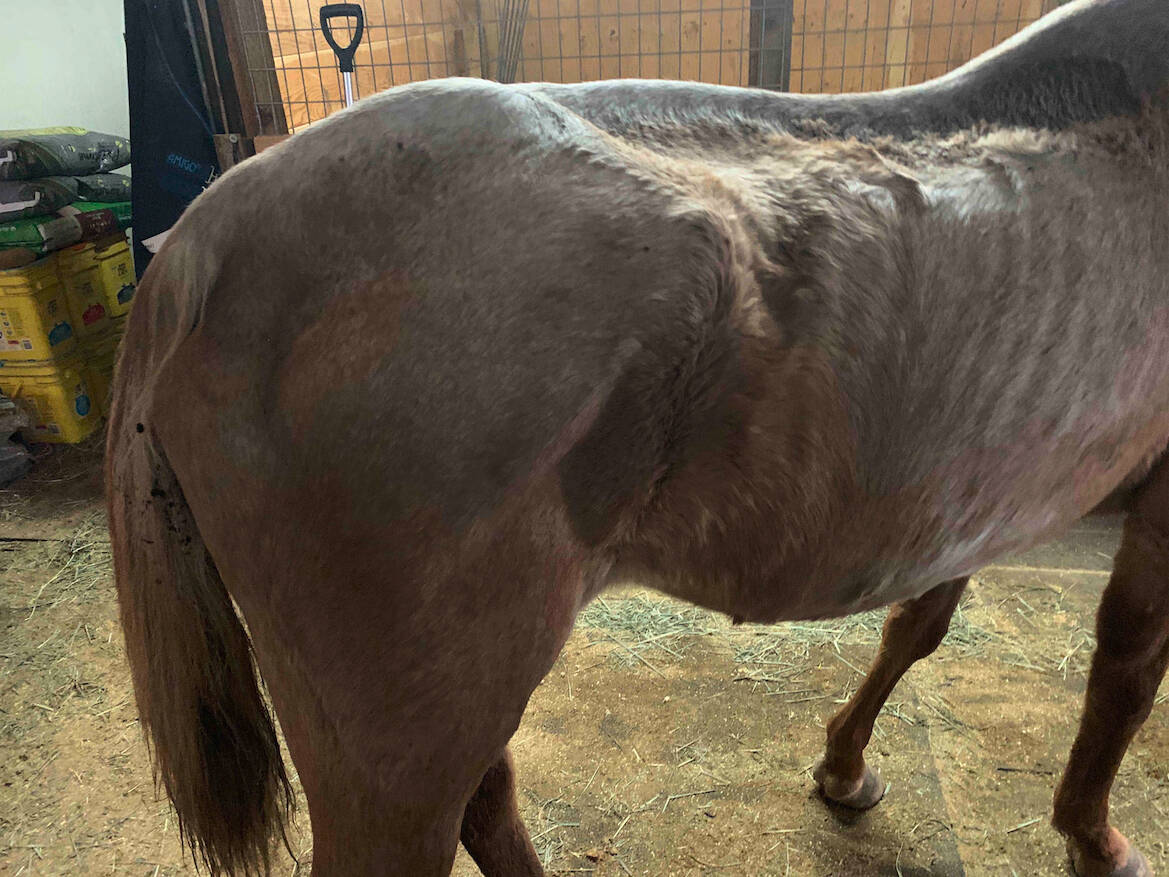The horses, dogs, cats, chinchillas, pigs and rabbits that have been living in shelters and temporary housing since being seized from a Hastie Lake Road farm last year may be available for adoption soon.
Island County prosecutors recently filed a motion of forfeiture of the critters in the animal cruelty case against 58-year-old Kristi L. Finch. The motion includes new details in a case that has garnered much public attention and spurred the creation of a Whidbey animal welfare group that’s advocated for changes to county policy.
A hearing on the motion will be held in Island County Superior Court Aug. 8.
Finch opposes the motion for forfeiture and filed her own declaration Aug. 2 in which she both asserts that her animals were not neglected and that she couldn’t get help from the community when she needed it. She wrote that two horses that were found dead on her property were a mother and daughter that suffered from “cribbing,” which is a repetitive behavior that can lead to weight loss.
“This was a one-time situation brought on by weather and other unforeseen circumstances, complicated by having a severely broken arm and certainly not the norm,” she wrote.
Prosecutors charged Finch early this year with two counts of animal cruelty in the first degree, five counts of animal cruelty in the second degree and tampering with a witness.
Prosecutors gave Finch notice that they intend to allege aggravating circumstances claiming that she knew or should have known the two horses that died on her property “were particularly vulnerable or incapable of resistance.” The aggravating circumstance could increase a potential sentence.
Finch, however, denied the allegations of animal cruelty.
“My horses have always been in good condition and well taken care of,” she wrote. “My horses are rarely sick or injured. Apart from the two cribbers, they are all trained very well and have excellent manners.”
She also wrote that she was seeking a loan to get her through the winter and planned to sell the majority of the horses in the spring.
The Island County Sheriff’s Office started investigating Finch on Dec. 24 after two dead horses were seen on her property.
A total of two pigs, 24 dogs, 31 cats, four chinchillas, 13 horses and multiple rabbits were removed from the property and placed in the care of nonprofit organizations, including Whidbey’s Animal Improvement Foundation, Pasado Safe Haven Animal Sanctuary and Save a Forgotten Equine, according to the motion for forfeiture. Chickens, both dead and alive, were also found on the property.
Other animals were also gifted to private citizens or voluntarily turned over, the motion states.
The prosecutor’s motion describes the investigation by Deputy Lane Campbell with the Sheriff’s Office that lead to the decision to remove the animals from the property.
“After listening to a litany of partial excuses and blame-shifting from (Finch) about a hay shortage, the weather, not being able to sell dogs and people not helping her enough, Deputy Campbell correctly concludes, ‘You’re not able to take care of the horses and we’re not going to have any more dead horses out here,’” the motion states.
The motion also includes reports from a veterinarian who describes the conditions of 16 horses, 31 cats and 24 dogs as well as the extensive medical treatment that many of the animals required.
A veterinarian wrote that the two dead horses suffered from “severe emaciation.” The report confirms that one of the horses wore a collar to treat “wind sucking,” which is behavioral issue akin to cribbing and can lead to weight loss and other problems. The report noted that a tree between the dead horses had severe bark wear consistent with chewing.
In addition, the veterinarian found that all the horses were below the ideal weight and many had teeth problems, overgrown hooves and high parasite loads. One female horse was extremely emaciated; a male was very thin with severely atrophied muscles; and another female was very thin with generalized muscle atrophy and urine scalding down her back legs. Three mares were pregnant.
One horse could not stand comfortably due to an untreated hoof abscess and another had an untreated chronic eye condition.
The veterinarian wrote that four cats were very thin and two were severely emaciated. Many of the cats had heavily matted fur with signs of flea dust and suffered from ear mites. Numerous cats were sick with upper respiratory infections in different degrees of severity.
One of the severely emaciated cats had difficulty breathing from suspected pneumonia, but responded to treatment and recovered at WAIF.
The veterinarian also examined the dogs and categorized six as very thin and two as severely emaciated. One of the dogs suffered from ear and eye inflammation, heavy dental tartar and inflammation, severely overgrown nails, severe matting and severe urine staining, the report states.
The veterinarian noted that “poor nutritional care has led to starvation conditions in numerous dogs and cats and general poor health for others.”
The veterinarian wrote that many of the dogs and cats were living in cages that were inadequate for their exercise needs.
The prosecutor’s motion includes documents from a 2009 Skagit County case in which Finch was charged with animal cruelty related to a puppy mill, but pleaded guilty to lesser offenses.
The motion for forfeiture concludes that the animals are currently adoptable and that Finch “has no right to interfere in or delay the adoption or disposition of the animals removed from her property.”



